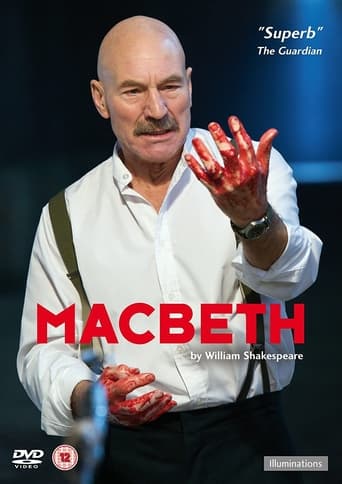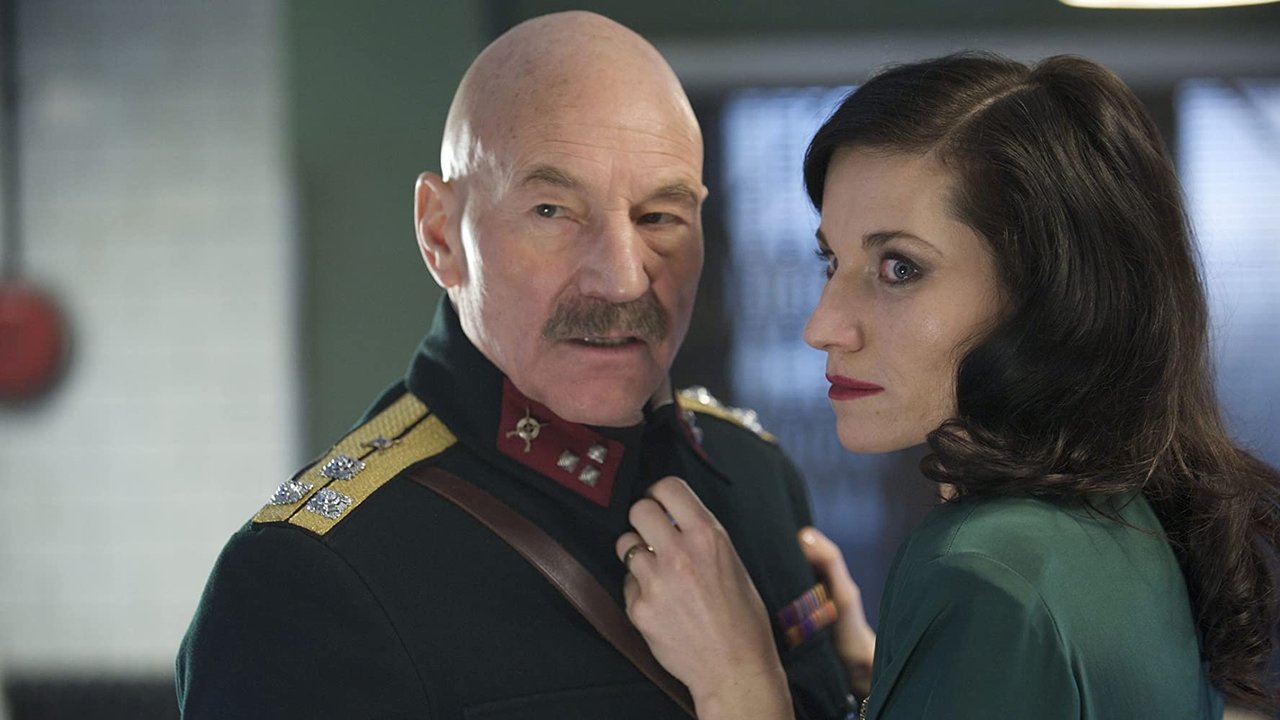sharky_55
I am always interested in the ways a Shakespeare adaptation can be morphed on the screen. This one, by RSC, does it well. It mirrors Stalin's rise and lust for power; there is a gigantic headshot emblazoned on a tapestry in the same vein, infamous moustache and all, of Patrick Stewart once he takes the throne in the dining hall. As they talk of sword fights, they brandish machine guns and weapons of far more lethality. This does not detract from the original play; the climatic fight between Macbeth and Macduff is done via knives, right after he thoroughly douses himself in alcohol and prepares for death. There are other touches that reinforce this contextual setting. Soviet documentary footage chimes in from dusty television sets and radios. Mechanical elevators creak sombrely and are later used for the metaphorical descent to hell for some of our dearly departed characters. The three witches become pale- faced nurses. Their introduction is fantastic; the horror aesthetic works well because of the seedy lighting, sound design which assaults our ears with scratches, screams and harrowing distortion and the sudden manner in which they are unveiled. Their prophecies become harrowing shrieks as they tend to lifeless patients which sudden crackle with life. The sets are few and sparsely decorated to great effect; there is nothing more illusory than a cold, expansive dining hall which the gramophone struggles to fill with dance music, nothing more grimy than the lone basin where Lady Macbeth sees gushing wounds, red gashes of blood and ruined clothes which she tries futilely to wash away. A leaky faucet sprays blood rather than pure water. The rusting claustrophobic walls close in on our characters in moments of great grief and anger and lust, and we see them for the monsters they truly are. Both Patrick Stewart and Kate Fleetwood's mastery of the material is clear. Their stage experience and familiarity with the roles allows Goold to use long takes for the soliloquies which heightens the tension and emotion their characters are going through. Fleetwood is terrifying in that first monologue, and then we abruptly cut and she is meekly scrubbing the dirty kitchen walls as Macbeth returns. They embrace with a violent sensuality (which later becomes uneven as the power dynamics of their relationship shift). She is of course initially more motivated to commit regicide than she is, but pulls off the domestic and matronly persona well, even as her mind is scheming beneath. She interrupts that conflicted soliloquy in the kitchen by Macbeth, thrusting her agency and drive into the scene as Stewart agonises over what is a clear sin. Later, Macbeth again confronts the consequences of such a deed, and the camera slowly zooms in and plunges Stewart into pitch black as he finishes with "to hell". His brutal descent into lust and power is accentuated by Stewart; he mimes the shooting of Banquo from afar in the idyllic courtyard, and later stares Macduff's innocent family in the eyes as he brandishes a knife. This kickstarts a Godfather-esque sequence where murders are committed over a haunting hymn and Macbeth's position on the throne is solidified for a little while. When the affluent and benevolent Duncan gathers his loyal subjects in his office, he pauses for a moment before announcing his son Malcolm as the next in line. The camera is however situated behind them, over their shoulder, and when Duncan makes that pivotal decision, Stewart is pushed into sharp focus; we see every ounce of disgust and confusion in his face after the witches promised a different outcome. I am reminded of a similar scene in RSC's Hamlet where Stewart as Claudius looks to address Hamlet first, but rebuffs him for the lesser Laertes. These little cinematic touches are great at unveiling subtext and character reactions that would be harder to spot on the stage. This adaptation is quite well done.
Will Conley
The "Out, damned spot" bit was killer.The "Out, out, brief candle" bit was worth the wait.Stewart's performance overall was stunning. Captain Picard was fun to watch and you could detect Stewart's gravitas in it; Dr. Xavier didn't stretch Stewart in the least and it was just a sweet paycheck for him, which I fully applaud him collecting. But this here is what Stewart was built for. The man is a beautiful monster in this performance.The whole cast was nearly pitch perfect.The witches were gloriously horrifying. The "Double, bubble, toil and trouble" bit was innovative and fun.Watch Lady Macbeth transform from a supremely manipulative banshee from Hell into a guilt-wracked suicidal lunatic.If you don't understand what's going on all the time, you're not alone, and take heart: this film's visuals help you along much of the way, without treating you like a moron.As for the script itself -- it's Shakespeare: raw, economical, polyrhythmic, full of slyly naughty jokes to try and catch, and full of linguistic innovation. Few writers have displayed such freedom with the language. If you're a writer, I advise you to take a cue from Shakespeare and just start breaking rules and making up new ones. This version of Macbeth should inspire you to do that.
sarastro7
I love all Shakespeare, but for some reason Macbeth is not among my favorite works of the Bard. Nor do I think that the brilliance of Shakespeare's darker plays are usually well-handled by directors. Consequently, I am difficult to impress when it comes to individual film or DVD productions of the play. I consider Polanski's very traditional 1971 version to be the best (a 9 rating), and my second favorite version is Jason Connery's underrated and rare 1997 production (which I rate an 8). For me, both Orson Welles', Ian McKellen's, Jeremy Brett's and now Patrick Stewart's versions rate no higher than a 7 out of 10, and that goes for Kurosawa's Throne of Blood as well. They're good, but considering how marvelously Shakespeare CAN be staged or filmed (think Branagh or Taymor), they are just not THAT good. Nicol Williamson in the BBC version was very underwhelming to me, although Jane Lapotaire as Lady Macbeth was at least as good as, perhaps better than, Francesca Annis in the Polanski version.What was wrong with Patrick Stewart's 2010 version? It had many good things and scenes in it. But I found it to be too dark (yes, such a thing is very much possible) and in places too dull and drawn-out. I liked the whole Stalin motif, but setting the play in an underground bunker just smacks of low-budget requirements. That it all sort of took place in hell was perhaps an interesting take, but it's not the kind of thing that resonates with me. I want an interesting, variegated, poetic environment; one that does Shakespeare's words justice, and provides an interesting interpretation of the scenes and phrases. A limited environment of darkness does nothing of the sort. But perhaps this all owes to the budgetary restraints. I admit they did go far with little - there were some impressive scenes here and there.Comparing this production with Ian McKellen's 1995 Richard III movie is very apt; McKellen did enact Adolf Hitler; Stewart did enact Joseph Stalin. Both productions had a war motif, a tyrant motif, murderers serving the king, etc. It is hard to believe that McKellen's RIII performance did not significantly inspire this Macbeth.Is it worth your while? Definitely. It is made by people who have an obvious understanding of staging Shakespeare, which in itself is very good. However, a fabulous masterpiece it is not. Good, but not THAT good.
Hurricane_Theresa
This is by far the best Macbeth I have ever seen. It is definitely not just a camera filming a stage production, it is a horror film. Everything from the acting to the lighting was fresh and original.Patrick Stewart and Kate Fleetwood are chillingly superb and the supporting cast just as good. There was not a weak link.Some people have said that Patrick Stewart is too old to play this part, however there is absolutely no indication of age anywhere in the text. In fact, the age of Macbeth compared to that of his wife's actually helps support Macbeth's sudden lust for power. He is a man who was satisfied to be the star military general, but when he married a young, ambitious (crazy) woman, it gave him a reason to want more.This is a better quality film than almost everything in theaters today.



 AD
AD


